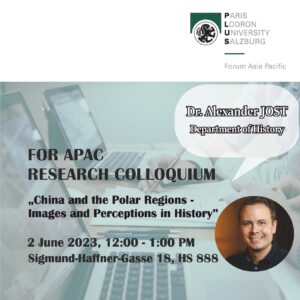FOR APAC Science Pitch
Monday, 12th of December 2022, 3:45 – 4:45 PM
HS 330, 3rd floor, Sigmund Haffner-Gasse 18
Speaker: Univ.-Prof. John Dunlop, Department of Chemistry and Physics of Materials, FOR APAC Board Member
Topic: „MorphoPhysics – Physical Explorations into Growth and Form“
FOR APAC Science Pitch
Monday, 23 January 2023, 2:00 – 3:00 PM
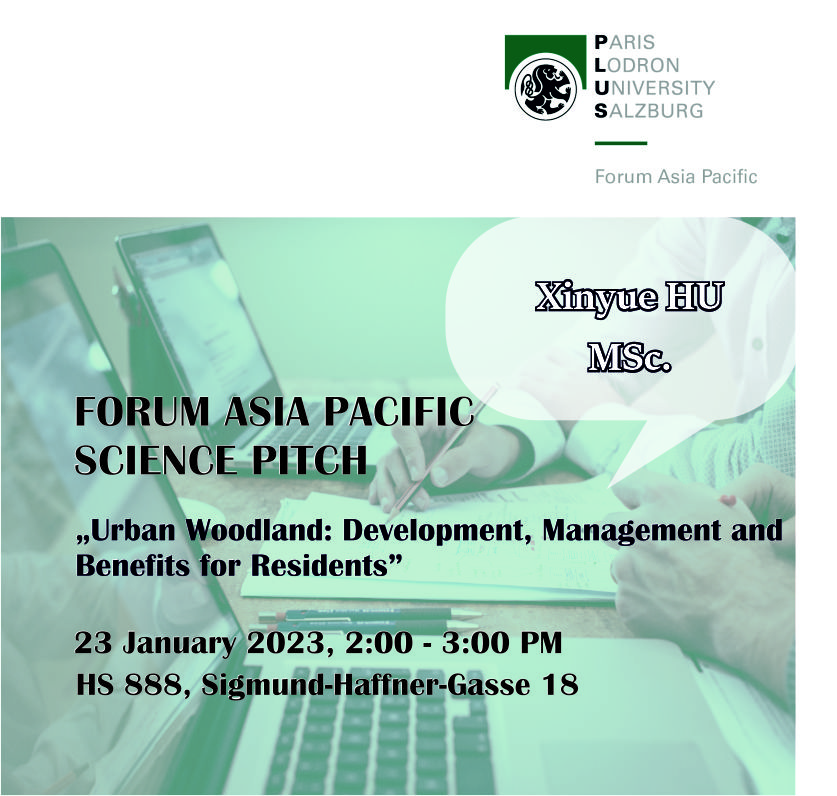
HS 888, Sigmund-Haffner-Gasse 18
Speaker: Xinyue HU, MSc., Department of Geology and Geography
Topic: „Urban Woodland: Development, Management, and Benefits for Residents
Urban growth has the biggest impact on worldwide development. However, severe challenges such as climate change and urban biodiversity loss, based on rapid urbanization and growing urban population, have affected both the lives of residents and urban nature. Urban woodland, a kind of urban nature, which provides a variety of ecosystem services and plays a vital role in urban green infrastructure. This talk will provide an overview of urban woodland research issues, classify and analyze the main sub-topics and methods, and also highlight the potential prospects of urban woodland study. Furthermore, we will also explore how urban dwellers can profit actually and potentially from urban woodland and how to make effective management strategies of urban woodland.
FOR APAC Research Colloquium Session
Join us for the third FOR APAC Research Colloquium Talk!
Friday, 21 April 2023, 12:00 – 1:00 PM
HS 888, 3rd floor, Sigmund-Haffner-Gasse 18
Online: Webex Link
Speaker: Dr. Shahnawaz SHAHNAWAZ (Department of Geoinformatics, PLUS)
Topic: “Geospatial Applications of Satellite Generated Atmospheric and Climatic Datasets”
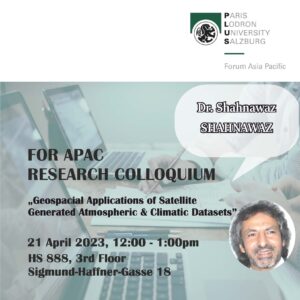
The presentation describes the importance of studying climate change, global warming, air pollution, glacial melt etc. and highlights spatial and temporal gaps in the data required for advanced analyses.
Further, it introduces selected satellite systems deployed for generated atmospheric and climatic datasets at regional and global scales and demonstrates their geospatial applications through some case studies.
FOR APAC Research Colloquium Session
Friday, 2 June 2023, 12:00 – 1:00 PM
HS 888, 3rd floor, Sigmund-Haffner-Gasse 18
Online: Webex Link
Speaker: Dr. Alexander JOST (FOR APAC Deputy Director, Department of History, PLUS)
Topic: “China and the Polar Regions – Images and Perceptions in History”
No Chinese territory lies north or south of the polar circles, and only since the last decades of the 20th century have Chinese researchers become active in the Arctic and Antarctic. Until then, for Chinese the poles of the Earth and their surroundings were a realm of imagination, estimation, or – at best – of believing the words of others. Understanding these phenomena and their changes throughout history is the topic of this talk.
FOR APAC Research Colloquium Session
Friday, 20 October 2023, 2:00 PM – 3:00 PM
HS 387, ground-floor, Rudolfskai 42, 5020 Salzburg
Online: Webex LINK
Speaker: Univ.-Prof. Kyoko SHINOZAKI, PhD (FOR APAC Deputy Director, Department of Sociology and Human Geography, PLUS)
Topic: „Migration/Mobility and Gender in Asia Pacific: Research Agenda“
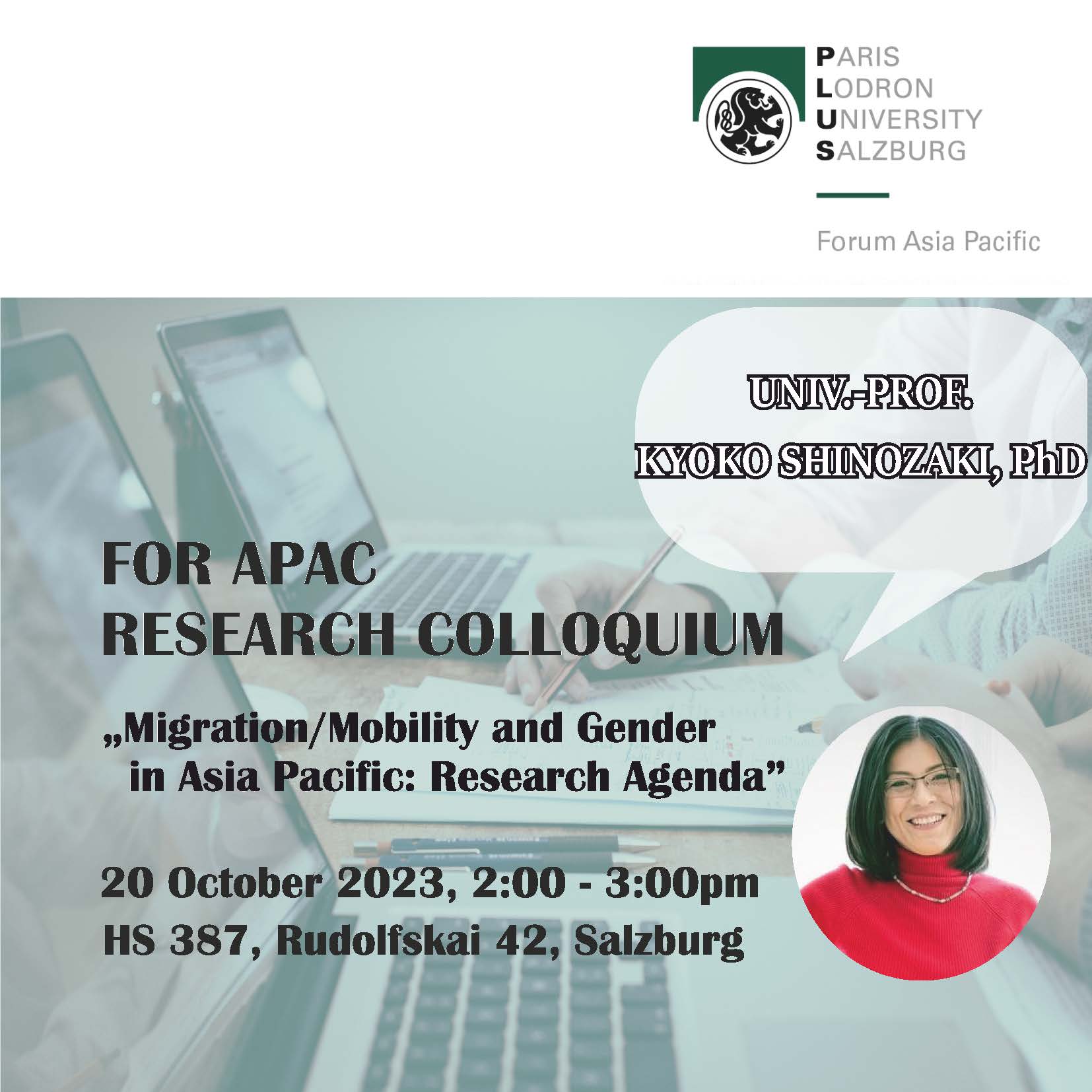 In her talk, Prof. Kyoko Shinozaki will discuss her main fields of research in migration/mobility studies and studies of sustainability, and why critical transdisciplinary ways of thinking and studying are necessary to understand the complexity of trans/local research agenda in our globalized setting.
In her talk, Prof. Kyoko Shinozaki will discuss her main fields of research in migration/mobility studies and studies of sustainability, and why critical transdisciplinary ways of thinking and studying are necessary to understand the complexity of trans/local research agenda in our globalized setting.
FOR APAC Research Colloquium Talk
Friday, 10. November 2023, 10:00 – 11:00 AM
SE U10, Department of History, Rudolfskai 42, Salzburg
Online: LINK
Meeting-ID: 385 925 689 686
Passcode: TVfzag
Lecturer: Univ.-Ass. Dr. Ruard William ABSAROKA (Department of Art, Music and Dance Studies, PLUS)
Topic: „On the Affirmative Knowledge Episteme as a Norm – and the Agnotological Alternative:Music in China as a Case Study“
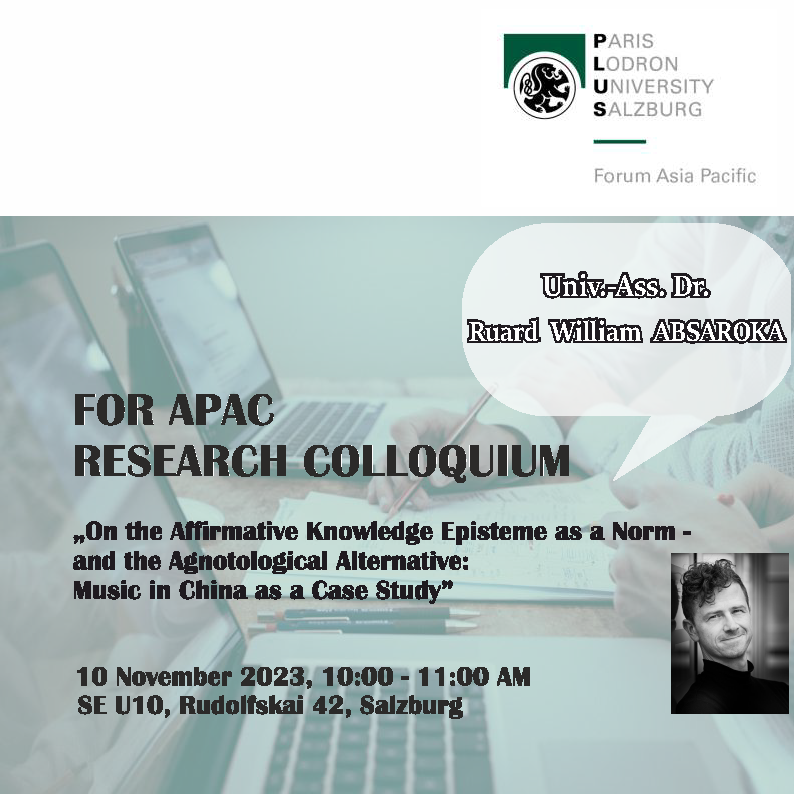 Epistemology is concerned with theories of knowledge, belief and rationality (how we know). Agnotology, defined as the ‚cultural production of ignorance‘ (or why we do not know), is a relatively recent term (Proctor and Schiebinger 2008) and an inchoate field of study. Fascinating work in agnotology has been done on the history of science, corporate and governmental obfuscation, and financial bubbles. A fledgling “anthropology of ignorance” recognises that knowledge and ignorance are always co-constituting, and that one must account for how ignorance can be rational, strategic or a matter of necessity. But how can an agnotological approach contribute to the understanding of musical practices? This talk argues that a focus only on affirmative knowledge practices in sonic contexts risks seriously misrepresenting sonic practices themselves. In fact, not-knowing, un-knowing, or un-hearing can be an inherent in both music and musicological scholarship. It may be rational to forget, there can be pleasure not knowing what comes next, excitement in the ignorance of manipulated expectation, playfulness in the doubt and uncertainty of improvisation.
Epistemology is concerned with theories of knowledge, belief and rationality (how we know). Agnotology, defined as the ‚cultural production of ignorance‘ (or why we do not know), is a relatively recent term (Proctor and Schiebinger 2008) and an inchoate field of study. Fascinating work in agnotology has been done on the history of science, corporate and governmental obfuscation, and financial bubbles. A fledgling “anthropology of ignorance” recognises that knowledge and ignorance are always co-constituting, and that one must account for how ignorance can be rational, strategic or a matter of necessity. But how can an agnotological approach contribute to the understanding of musical practices? This talk argues that a focus only on affirmative knowledge practices in sonic contexts risks seriously misrepresenting sonic practices themselves. In fact, not-knowing, un-knowing, or un-hearing can be an inherent in both music and musicological scholarship. It may be rational to forget, there can be pleasure not knowing what comes next, excitement in the ignorance of manipulated expectation, playfulness in the doubt and uncertainty of improvisation.
Adorno’s negative dialectics was one attempt to break free from affirmative epistemic assumptions from Plato to Hegel, but the ideological nature of the ubiquitous and normative “epistemocratic” stance is revealed by how invisible are critical perspectives that point out the contradictions or gaping lacunae in dominant approaches to musical knowledge. There are, for instance, many theories of musical learning and much scholarly focus on the acquisition of musical skills. Far less attention is paid to occasions in which skills that have to be un-learned, or to barriers to such acquisition, or the imperatives that militate towards musical ignorance (and hence musical illiteracy, inequalities, poverty). And the agnotological lens has a direct bearing on other questions. Who has rights of access to musical knowledge? What defines amateur versus professional participation? How are genres policed? Who gets to be a ‚cultural omnivore‘? Touching on case studies from China, and the humbling admissions of ignorance that are a foundational part of the ethnomusicological imperatives to pursue performance-as-research, I investigate sonic agnotological alternatives.
Ruard Absaroka is a Post-Doc in the Department of Music and Dance at the University of Salzburg. Born in England, he spent lengthy periods of his childhood and schooling in the Middle East, particularly in Turkey. A first degree, at Oxford University, was followed by Masters and then Doctoral Studies at the University of London (SOAS: School of Oriental and African Studies). His AHRC-funded doctoral thesis (long-listed for the ICAS Dissertation Prize, IBP 2017), is on urban musical geographies and ‘Rights to the City’ in Shanghai, China. In the course of doctoral studies, he studied at the Shanghai Conservatory of Music and also worked in parallel on the Leverhulme/AHRC-funded ‘Sounding Islam in China’ project. He taught for several years in the UK, particularly as a Senior Teaching Fellow at SOAS. His research interests include the music and performance traditions of East Asia, Sound Studies, ethnographic film-making, music and migration, and global histories of night life.
As an active musician, he is a classically trained piano and violin player, recorded and toured with an Oxford college choir, co-organised long-standing club nights as a founding member of a London jazz/hip-hop collective, has led a Chinese Music Ensemble and co-founded the London Xiqu Chinese Opera Network. In his spare time, he is also known to have performed Korean Samulnori percussion at such venues as the O2 Stadium in London and is rumoured to have toured extensively with a revolutionary guerrilla Ceilidh ensemble. He currently serves as a board member of the Asia-Pacific Forum (Uni. Salzburg), on the committee for the British Forum for Ethnomusicology (BFE) and the Austrian national committee for ICTMD (ICTMD-Ö). He is an active participant member of other professional bodies including CHIME (Chinese Music Research in Europe), SEM (Society for Ethnomusicology) and ICTMD (International Council for Traditions of Music and Dance).
FOR APAC Research Colloquium Talk
Friday, 15 December 2024, 1:00 – 2:00 PM
HS 888, Forum Asia Pacific, 3. floor, Sigmund-Haffner-Gasse 18, Salzburg
Vortragende: Professor Dr. Tanja BÜHRER (Department of History, PLUS)
Thema: “THE AGE OF REVOLUTION FROM A SOUTH ASIAN PERSPECTIVE, 1770-1815”
The decades straddling the late Eighteenth and early Nineteenth Century, which historians call the “age of revolutions”, traditionally encompass an Atlantic triangle of grand event. By looking to South Asia and the Indian Ocean, the intent is to shed light on the significance of events in this forgotten quarter of the globe at the time. Upon the French declaration of 1778 to fight Britain in the American Revolutionary War, Anglo-French rivalries in South Asia intensified as well and revolutionary rhetoric began to circulate. Indian rulers became interested in the theatres of war both in Europe and the Western Hemisphere and thus added to the globally connected interactions of different world regions. This paper aims to show how Indian, French, and British agents in the Indian Ocean used and interpreted global news to pursue their own interest. Far from being mere followers of what was crafted in the Atlantic, they created their own revolutionary or counter-revolutionary political agenda.
Tanja Bührer completed her PhD in 2008 at the University of Bern (Switzerland) on German colonial Security Policy and the German colonial armies. In 2019 she completed her Habilitation on Intercultural Diplomacy between South Asian powers and the French and British companies in the Age of Global Reforms and Revolutions, c. 1770-1815. She was awarded several Mobility Fellowships from the Swiss National Science Foundation to conduct her research in Germany, UK, France, Tanzania and India, where she was visiting fellow at internationally distinguished institutions such as the HU Berlin, the University of Oxford, the SOAS London, and the Jawaharlarl Nehru University. Before she joined the PLUS as Professor of Global History she was Visiting Professor for Modern and Contemporary History at the Ludwig-Maximilian-University of Munich (Lehrstuhlvertretung).
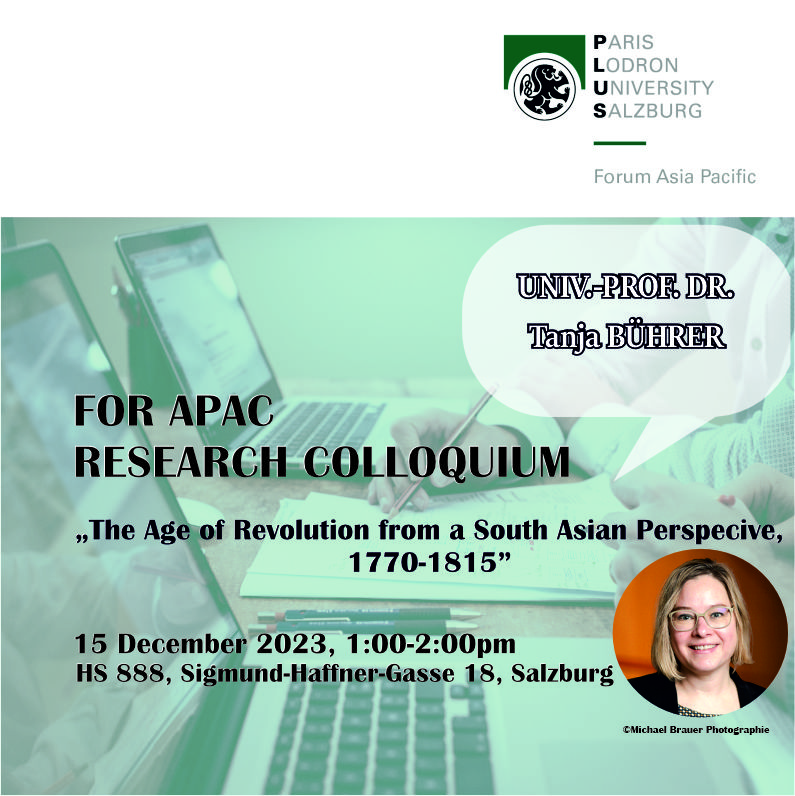
FOR APAC Research Colloquium Talk
Wednesday, 6 March 2024, 12:00 – 1:00 PM
HS 888, Forum Asia Pacific, 3rd floor, Sigmund-Haffner-Gasse 18, Salzburg
Online: LINK
Meeting-ID: 324 883 496 774
Passcode: t2AuBx
Lecturer: Assoz.-Prof. Dr. Martin RÖTTING (Department Systematic Theology, PLUS)
Topic: „Contemporary Spirituality in South Korea”
The Koreans are a very religious productive nation with uncounted religions and spiritual groups founded since 1952. While the Kwanum Zen School (Seung Sahn) or the Unification Chruch (Moon in 1954) are known worldwide, others have had their impact mostly on the peninsula. How do Koreans navigate in this plural spiritual society and what impact does it have on their spiritualty? How does the history of Korea effect the development? Are there typicality’s to Korean Spirituality and Religions of today? How do interreligious dialogue movements effect the relations and how do traditional forms like Shamanism fit into the dynamic process?
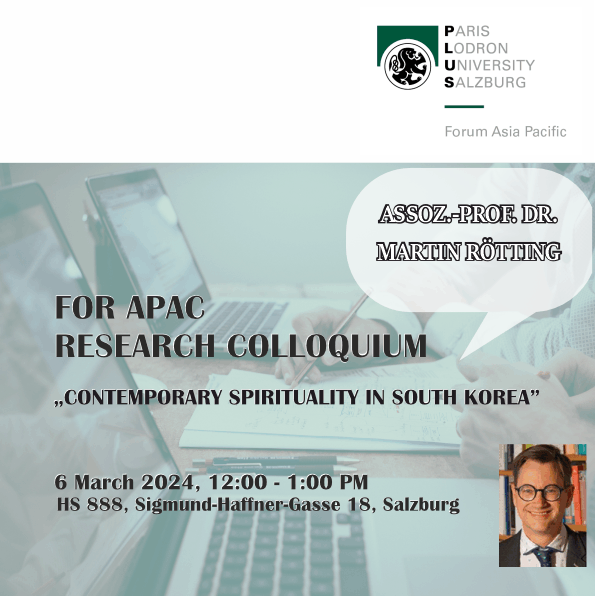 For more information on Prof. RÖTTING, please clik here.
For more information on Prof. RÖTTING, please clik here.

